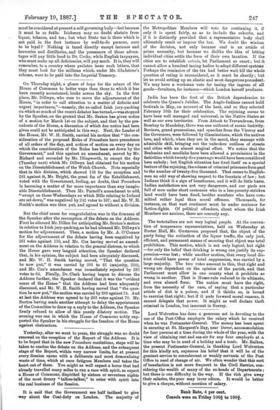But the chief cause for congratulation was in the firmness
of the Speaker after the resumption of the debate on the Address. First he silenced Mr. Dillon for anticipating Mr. Sexton's motion in relation to Irish jury-packing, as he had silenced Mr. Dillwyn's motion for adjournment. Then, a motion by Mr. A. O'Connor for the adjournment of the debate having been negatived by 261 votes against 110, and Mr. Cox having moved an amend- ment on the Address in relation to the general distress, to which the House gave very languid attention, the Speaker declared that, in his opinion, the subject had been adequately discussed, and Mr. W. H. Smith having moved, 'That the question be now put," it was carried by 291 to 81 (majority, 210), and Mr. Cox's amendment was immediately rejected by 283 votes to 84. Finally, Dr. Clark having begun to discuss the Address further, the Speaker declared that it was the "evident sense of the House" that the Address had been adequately • discuseed, and Mr. W. H. Smith having moved that "the ques- tion be now put," the motion was carried by 289 against 74. And at last the Address was agreed to by 283 votes against 70. Mr. Sexton having made another attempt to delay the appointment of the Committee to draw up a reply to the Address, the Speaker firmly refused to allow of this purely dilatory motion. The evening was one in which the House of Commons nobly sup- ported the Speaker in his struggle for the freedom of the House against obstructors.


































 Previous page
Previous page